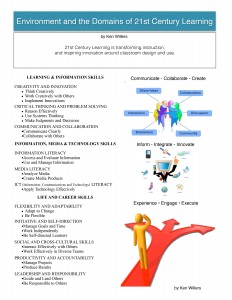Guest post written by Kenneth Willers, principal at School of the Madeleine in Berkeley, California. Follow him on Twitter @21stCenPrinKW and join him this afternoon as he co-hosts NCEA’s Google Hangout at 1 PM EST.
What/Who is 21st Century Learning?
Did you know that today’s kindergarteners will retire around the year 2074?
Astonishing to think, huh? But, it serves as a stark reminder that we, as Catholic educators, are called to prepare today’s five-year-olds, as Ian Jukes stated, “for THEIR future and not our past.”
In 21st Century Learning students who can think critically and communicate effectively are better able to build on their base of core knowledge. Within the context of 21st Century Learning of core knowledge and faith instruction, students also learn the essential skills for success in today’s world, such as critical thinking, problem solving, communication and collaboration. When Catholic schools build on these skills by combining the necessary support systems—standards, assessments, curriculum and instruction, professional development, faith formation and learning environments—students are more engaged in the learning process and graduate better prepared to serve the Church and to thrive in today’s global economy.
We can divide these 21st Century skills into three domains:
 LEARNING AND INNOVATION SKILLS
LEARNING AND INNOVATION SKILLS
Learning and innovation skills are increasingly being recognized as those that separate students who are prepared for a more and more complex life and work environments in the 21st century, and those who are not. Catholic schools across the country must have a renewed focus on creativity, critical thinking, communication and collaboration as essential to prepare students for the future.
INFORMATION, MEDIA AND TECHNOLOGY SKILLS
People in the 21st century live in a technology and media-suffused environment, marked by various characteristics, including: 1) access to an abundance of information, 2) rapid changes in technology tools, and 3) the ability to collaborate and make individual contributions on an unprecedented scale. To be effective in the 21st century, Catholic school students must be able to exhibit a range of functional and critical thinking skills related to information, media and technology.
LIFE AND CAREER SKILLS
Today’s life and work environments require far more than thinking skills and content knowledge. The ability to navigate the complex life and work environments in the globally competitive information age requires students to pay rigorous attention to developing adequate life and career skills. Catholic schools must create opportunities for students to practice, develop, and translate life and career skills, along with innate talents and personal interests into real life experiences.
What is so impressive is the number of Catholic educators who have embraced the essentials of 21st Century Learning. Many Catholic schoolteachers across the country have an intuitive sense of the type of skills today’s students are going to need to be successful in their future life and career. As a result, many Catholic schoolteachers incorporate 21st Century learning proficiencies, listed above, into their educational vision as well as into their students’ learning expectations. I would like to add, that this 21st Century vision certainly rings true for the amazing educational community at the School of the Madeleine, where I have the honor as serving as principal—and it is exciting behold.
The Good News is—It’s happening! Catholic schools across this country are blazing trails, transforming learning and inspiring souls. As I engage Catholic educators across the county the innovative and collaborative spirit I encounter is truly inspiring. I have often remarked after meeting these great Catholic educators, ‘Look at what is possible… When innovative schools with innovative vision, inspire innovative students to use innovative tools…we actually empower and prepare our students for a future they will be called upon to create.’